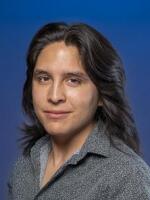As the Hamas-Israel conflict continues, pro-Palestinian protests have erupted on college campuses across America. Recently, the protests included quad encampments and administrative building occupations that resulted in hundreds of students being arrested. In Southern Nevada, UNLV has seen a quieter, but no less passionate, version of events.
Students for Justice in Palestine, a UNLV student group, have organized protests and discussions both on campus and in Las Vegas. Matthew and Hamza, who declined to give their last names out of concerns for their safety, are members of Students for Justice In Palestine.
When asked what motivated him to join the group and take on an organizer role, Matthew said, “For me, growing up, I’ve had a lot of Arab friends, Jewish friends, Muslim friends, especially in high school. I got involved in Model United Nations … we talked a lot about what’s been happening and the international history of Palestine and Israel.”
Born in Jordan, Hamza has family in the West Bank, but they’re currently in a safe area. “I've always been very pro-human rights,” he said. “And seeing people speak the same language, dying in the thousands … made it like a task to support my people.”
On Wednesday May 1 Students for Justice In Palestine, along with other like-minded organizations, held one of several protests they’ve done at UNLV.
“It was completely peaceful on our side,” Matthew said. “We chanted, we did speeches aimed at the [UNLV] administration and demanding divestment. On the other side, we had some counter protesters there that had to be apprehended by [university] police because they were trying to agitate the protest.”
Matthew and Hamza’s group, along with other local coalitions, are demanding that organizations like UNLV divest from pro-Israel interests. It’s not unlike what many other pro-Palestinian students and groups across the country are asking of their universities.
In an attempt to force the university to meet their demands, some students have been participating in a hunger strike since May 1.
UNLV provided a statement that read in part:
“We will continue to work with specific affinity groups on campus to help ensure our university policies are followed and continue our dialogue to hear different perspectives on this complex issue.”
ANONYMITY AND MEDIA
Anonymity is important for Students for Justice in Palestine, so much that they fear for their safety.
“I haven't faced anything yet, but I am very careful,” Hamza said. “I fear being kicked out of college, maybe having my personal information leaked online by extremists on the other side.”
Matthew also said he feels the media hasn’t been fair to those on his side of the issue.
On February 28th, a group of pro-Palestinian UNLV students interrupted a physics lecture by visiting Israeli Professor Asaf Pe’er. The lecture was eventually stopped by university police, and the professor was escorted out.
“A lot of media covered it as if the students were trying to protest him and shut him down because he was Israeli,” Matthew said. “No media reached out to the student group that posted the video online.” He added that the professor was protested because of comments made on his Facebook that pro-Palestinians saw as hateful.
Matthew gave this example. “One of his posts said, ‘We're not doing this to teach them a lesson, we're doing it because we learned ours,’ and it showed a photo of rubble in Gaza.”
The comment was shared on Pe’er’s personal Facebook account on October 29, 2023. He provided KNPR with a statement that denied his Facebook posts were hateful. It read in part: “The war in Gaza was forced on Israel, who didn’t want it and didn’t plan it. The IDF is taking many measures to minimize the damage to those not involved. Israel, multiple times, warned civilians to evacuate fight zones, in order to minimize the damage to innocents. Had it wanted to conduct genocide, clearly it wouldn’t do that. Unfortunately, in a war, any war, innocent civilians are hurt.”
As for the students’ conduct, the professor added, “I consider the incident as a discrimination based on nationality. As the protesters entered the room, I invited them to stay if they wanted to learn about black holes, and I clarified that I am willing to listen to everything they want to say, after the seminar is over. However, their intention was to prevent me from speaking.”
KNPR is committed to sharing voices from various perspectives on the conflict in the Middle East. For more, see the links in the “related content” section included.
Guests: Matthew, student and organizer, Students for Justice in Palestine; Hamza, student and member, Students for Justice in Palestine









